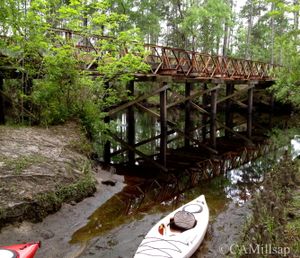Travel: Kayaking the New River in Franklin County, Florida
The dark water of the New River slips silently downstream, continuing to carry my kayak forward whenever I lift my paddles, allowing me to float quietly for a few minutes absorbing the sights and sounds and the lush North Florida landscape around me.
Tall Tupelo trees, with their bright green leaves and graceful branches, reach out over the orchid-like blooms of flowers that bloom along the riverbanks.
The air is heavy with moisture but the morning is cool, the sun hidden in the low clouds. The sound of birds is all around us.
We put in at a bend in the river at Tate’s Hell State Forest, near the small town of Carrabelle, beside a narrow steel bridge that rumbles and whines when vehicles cross on Gully Branch Road. Knobby cypress knees poke up out of the thick black mud that sucks at our sandals as we step into our kayaks.
We push away and the world immediately closes around us.
When most people think of Florida, postcard images of broad white beaches, high rise condominiums and crowds come to mind. And that is certainly true for most of the state. But the northernmost part, the panhandle of the peninsula, is a unique blend of pinewood forest, smooth sandy coastline and fertile estuaries. Green, lush, forest gives way to sandy beaches and streams and rivers, like the New River, feed fresh water into surrounding watersheds and eventually into Apalachicola Bay. This part of Florida, Franklin County, is sometimes called 'the forgotten coast' and it does feel as though the worst of progress--the noise, the crowds, the congestion and careless treatment of the natural world--has raced past. A blessing, I think, in this case.
I realize the rest of my group has moved ahead, around the next bend, and I am alone. There is a sense of mystery in the moment. Paddling along the surface of the water, even though the morning is cool, I watch for snakes at the edge of the river. On the drive to the park I caught sight of an alligator in a small stream beside the road and I know alligators can be found in the water but I’m relieved that they stay out of sight while I am there. I see an eagle flying overhead, one sharp eye trained on me, I’m sure. Black bear, cats and countless other wild creatures call this place home and I wonder what they make of the people who come to play.
We pull out of the water just as a soft rain begins to fall. After the kayaks are loaded and we are back in the river guide’s van, I look out the window. Already there is a break in the sky and a patch of bright blue shines through. And the black water of the river, relieved again of the weight and interruption of interlopers, moves silently on.
Cheryl-Anne Millsap is a travel writer whose audio essays can be heard on Spokane Public Radio and on public radio stations across the country. She is the author of ‘Home Planet: A Life in Four Seasons’ and can be reached at catmillsap@gmail.com
